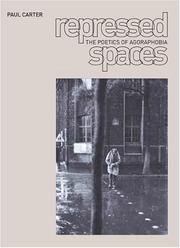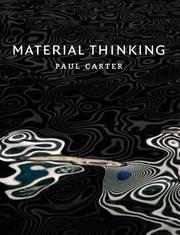| Listing 1 - 10 of 34 | << page >> |
Sort by
|
Book
Year: 2004 Publisher: Carlton : Melbourne university press,
Abstract | Keywords | Export | Availability | Bookmark
 Loading...
Loading...Choose an application
- Reference Manager
- EndNote
- RefWorks (Direct export to RefWorks)
- A pattern made of holes : creative research and local invention ##- Bearing witness to the eyewitness ##- As we see them right here ##- Wrong footings ##- An ephemeral architecture ##- Remembering forwards ##- Speaking pantomimes ##- Offcuts of infinity : artistic collaboration and material thinking.

ISBN: 1861891288 Year: 2002 Publisher: London : Reaktion books,
Abstract | Keywords | Export | Availability | Bookmark
 Loading...
Loading...Choose an application
- Reference Manager
- EndNote
- RefWorks (Direct export to RefWorks)
Agoraphobia in literature. --- Agoraphobia --- Space (Architecture) --- History. --- Social aspects. --- Psychological aspects.
Book
ISBN: 1907585699 Year: 2012 Publisher: CoramBAAF
Abstract | Keywords | Export | Availability | Bookmark
 Loading...
Loading...Choose an application
- Reference Manager
- EndNote
- RefWorks (Direct export to RefWorks)

ISBN: 052285124X 9780522851243 9780522867213 Year: 2004 Publisher: Victoria Melbourne University Publishing
Abstract | Keywords | Export | Availability | Bookmark
 Loading...
Loading...Choose an application
- Reference Manager
- EndNote
- RefWorks (Direct export to RefWorks)
Material Thinking is a ground-breaking book for artists, and for those who study or teach in the arts.Author and artist Paul Carter provides an intimate, first-hand account of how ideas are turned into works, and how the material thinking these artworks embody produces new understandings about ourselves, our histories and the culture we inhabit.Taking as his subject several artistic collaborations which resulted in performances, exhibitions or videos, Carter explores how each unfolded. In the course of this analysis he constructs a philosophy of how the practice and theory of making art are interconnected, a philosophy powerful enough to provide an intellectual underpinning for the new, and still developing, field of creative research.
Art --- Idea (Philosophy) in art --- Appreciation --- Philosophy --- Arts
Book
ISBN: 0522867219 Year: 2004 Publisher: Victoria, Australia : Melbourne University Publishing,
Abstract | Keywords | Export | Availability | Bookmark
Book
ISBN: 9780824862145 Year: 2008 Publisher: Honolulu
Abstract | Keywords | Export | Availability | Bookmark
 Loading...
Loading...Choose an application
- Reference Manager
- EndNote
- RefWorks (Direct export to RefWorks)
Book
ISBN: 9781351213035 9780815380498 9780367585754 Year: 2018 Publisher: Boca Raton Routledge
Abstract | Keywords | Export | Availability | Bookmark
 Loading...
Loading...Choose an application
- Reference Manager
- EndNote
- RefWorks (Direct export to RefWorks)
Power may be globalized, but Westphalian notions of sovereignty continue to determine political and legal arrangements domestically and internationally: global issues - the legacy of colonialism expressed in continuing human displacement and environmental destruction - are thus treated ‘parochially’ and ineffectually. Not designed for dealing with situations of interdependence, democratic institutions find themselves in crisis. Reform in this case is not simply operational but conceptual: political relationships need to be drawn differently; the cultural illiteracy that prevents the local knowledge invested in places made after their stories needs to be recognised as a major obstacle to decolonising governance. Archipelagic thinking refers to neglected dimensions of the earth’s human geography but also to a geo-politics of relationality, where governance is understood performatively as the continuous establishment of exchange rates. Insisting on the poetic literacy that must inform a decolonising politics, Carter suggests a way out of the incommensurability impasse that dogs assertions of indigenous sovereignty. Discussing bicultural areal management strategies located in south-west Victoria, Maluco (Indonesia) and inter-regionally across the Arafura and Timor Seas, Carter argues for the existence of creative regions constituted archipelagically that can intervene to rewrite the theory and practice of decolonisation. A book of great stylistic elegance and deftness of analysis, Decolonising Governance is an important intervention in the related fields of ecological, ecocritical and environmental humanities. Methodologically innovative in its foregrounding of relationality as the nexus between poetics and politics, it will also be of great interest to scholars in a range of areas, including communicational praxis, land/sea biodiversity design, bicultural resource management, and the constitution of post-Westphalian regional jurisdictions.
Communication in politics --- Self-determination, National --- Regional planning --- Environmental management --- Archipelagoes --- Decolonization
Book
ISBN: 3031606884 Year: 2024 Publisher: Cham : Palgrave Macmillan,
Abstract | Keywords | Export | Availability | Bookmark
 Loading...
Loading...Choose an application
- Reference Manager
- EndNote
- RefWorks (Direct export to RefWorks)
This book is a practice-based exploration of the politics and poetics of replacing colonial place names with Indigenous ones. From a horizon of case-studies in Western Australia, the study develops a lively dialogue with international critical toponymy theory and with older etymological approaches to place renaming and legitimation. The author shows how renaming raises fundamental questions of meaning, reference and cross-cultural equivalence. Recognising the 'sense of place' values that accrue to placenames, Carter argues that placenames have a creative as well as discursive function: they are talking points that bring places into being. For this reason, to decolonize toponymy involves a postcolonial poetics. Naming No Man's Land argues for a practical, community-shaped toponymic poetics that escapes from the binarist logic of imposition/erasure, showing that, when the principle that 'places are made after their stories' is followed, new creative mechanisms of co-existence can emerge. A must read for anyone engaged in postcolonial studies, creativity studies, cultural geography, sociolinguistics, historical ethnography, eco-criticism, environmental humanities, (Australian) Aboriginal studies, and related disciplines
Names, Geographical --- Toponymy --- Decolonisation --- Language - Vocabulary - Place names --- Aboriginal Australian
Multi
ISBN: 9780824862145 9780824832469 Year: 2008 Publisher: Honolulu, Hawaii University of Hawaii Press
Abstract | Keywords | Export | Availability | Bookmark
 Loading...
Loading...Choose an application
- Reference Manager
- EndNote
- RefWorks (Direct export to RefWorks)
Book
ISBN: 0231042108 Year: 1977 Publisher: New York
Abstract | Keywords | Export | Availability | Bookmark
 Loading...
Loading...Choose an application
- Reference Manager
- EndNote
- RefWorks (Direct export to RefWorks)
Fiction --- English literature --- Science fiction --- American periodicals --- Literature and technology --- Science-fiction --- Périodiques américains --- Littérature et technologie --- History and criticism --- Periodicals --- History --- Social aspects --- Histoire et critique --- Périodiques --- Histoire --- Aspect social --- Literature and technology. --- History. --- History and criticism. --- Social aspects. --- Périodiques américains --- Littérature et technologie --- Périodiques
| Listing 1 - 10 of 34 | << page >> |
Sort by
|

 Search
Search Feedback
Feedback About UniCat
About UniCat  Help
Help News
News